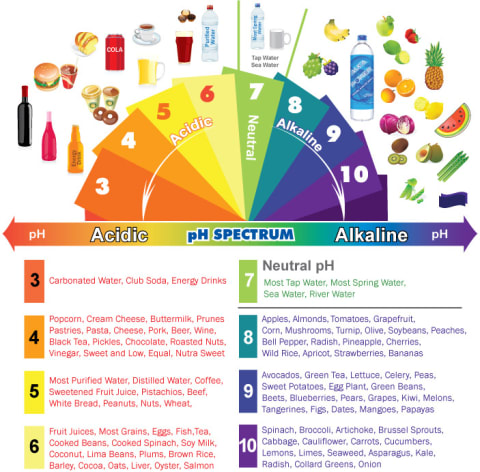Advertisement
Investigating The Alkaline Diet: Does It Really Move The Needle On Health?


If you've ever heard an influencer or celebrity say that they eat "alkaline foods," it probably made you scratch your head. Supporters of an alkaline diet claim it can enhance overall health, improve energy levels, and even prevent chronic diseases like cancer—but this sure sounds too good to be true.
So, is the alkaline diet really worth following? Or is it yet another diet popularized by social media that is more bark than bite? Let's dig into everything you need to know about the alkaline diet, including the evidence for and against it, so you can make an informed choice about how you fill your plate.
The need-to-knows:
Supporters of the alkaline diet make some big claims: They claim that eating alkaline foods may improve bone health, weight management, and cancer risk reduction.
There's not enough research to support the alkaline diet: Most of the benefits of this diet probably come down to the fact that most alkaline foods are whole, plant-based ingredients. But they don't change your blood pH in any meaningful way.
That said, some people will want to limit acidic foods for other reasons: Acidic foods can sometimes exacerbate GERD symptoms or may negatively impact the kidneys in patients with kidney disease.
What are alkaline foods?
Different foods have different levels of acidity. Foods that are highly acidic are called “acidic” foods, and those that are not acidic at all are called “alkaline.” Some refer to alkaline foods as basic.
The acidity or alkalinity of foods are measured by their pH, and it is measured on a scale of 0 to 14. Foods that are considered acidic, like vinegar, alcohol, and citrus foods, have a pH of less than 7. And on the flipside, alkaline foods have a pH higher than 7.
Foods with a pH value of 7 are usually classified as neutral. This means they neither contribute to acidity nor alkalinity in the body. An example of such food is distilled water, which is considered the standard for the pH scale.
Here is an example of an alkaline diet chart that shows how different foods fall on the pH scale. Note that the scale shows that some foods (like lemons) have an acidic pH but an "alkalizing effect" on the body. This idea that different foods can affect blood pH in this way has been debunked—and we'll get to why below.
What is the alkaline diet?
The alkaline diet, also known as the acid-alkaline diet or alkaline ash diet, revolves around the idea of optimizing the body's pH level. Proponents claim that by replacing acid-forming foods with alkaline foods, you can improve your health and prevent various diseases.
The general guideline when following this diet is to consume approximately 70-80% alkaline-forming foods and 20-30% acid-forming foods to maintain a balanced pH level within the body.
Alkaline foods list
"Alkaline foods", which are not acidic, include a varieties of fruits, veggies, and other nutrient-dense options. Here are 10 alkaline foods heavily featured in the alkaline diet—note that most of them also bring nutritional benefits to the table:
- Spinach: This leafy green is packed with nutrients.
- Kale: Like most leafy greens, kale is filled with beneficial vitamins and minerals.
- Cucumbers: Known for their high-water content, cucumbers are hydrating.
- Avocados: Avocados are a good source of healthy fats.
- Broccoli: This green vegetable contains beneficial nutrients like fiber, vitamin C, and potassium.
- Celery: Celery is another hydrating food that's packed with vitamins.
- Almonds: Almonds are a great source of healthy fats and plant-based protein.
- Bananas: Bananas are known for being high in all-important potassium.
- Quinoa: Quinoa is a high-protein grain.
- Sweet Potatoes: Sweet potatoes are packed with vitamin A, vitamin C, and dietary fiber.
Acidic foods list
Acidic foods can also provide important nutrients and flavor to a balanced diet. Here are some popular acidic foods:
- Proteins: Meat, Poultry, Fish, Eggs, Dairy
- Grains: Wheat, Rice, Oats, Corn, Rye
- Fruits: Blueberries, Cranberries, Citrus
- Beverages: Coffee, Alcohol, Carbonated drinks, Fruit juices
- Oils: Butter, Canola oil, Sunflower oil
- Nuts & Legumes: Walnuts, Brazil nuts, Peanuts, Pecans, Cashews, Lentils
- Other: Sugar, Chocolate, Vinegar, Ketchup, Mayonnaise
Debunking the alkaline diet
Although the alkaline diet has gained some traction over the years, the medical community is not a fan of it. This is because there isn’t enough evidence that suggests eating this way actually offers any benefits.
“For healthy people, your body will keep your blood pH in tight balance, even if you don't follow an alkaline diet,” explains nutritionist Jen Scheinman, MS, RDN. “Your lungs and kidneys work 24/7 to ensure that your blood pH is tightly regulated, no matter what foods you eat," she added.
When looking at the kidney’s role in the pH-balance story, this organ helps manage the body's pH balance by regulating sodium bicarbonate, a compound which is alkaline in nature and helps neutralize acid. When the body becomes too acidic, the kidneys are able to impact the level of sodium bicarbonate in the body to prevent the it from entering a severely acidic state.
In addition to the kidneys, the lungs also play a pivotal role in maintaining the body's pH balance. This is achieved through the process of respiration—inhaling oxygen and exhaling carbon dioxide, which is an acid. When the body's pH balance veers towards acidity, the rate of respiration increases, leading to a higher expulsion of carbon dioxide and, consequently, lowering the acidity in the body.
Some parts of the body are also naturally more acidic than others—and that's a good thing. Your stomach, for example, provides a highly acidic environment1 to break down foods, while your skin is mildly acidic to keep surrounding bacteria out.
One study suggested that, although eating foods that are alkaline may support bone health, intervention studies with a more alkaline diet have not consistently shown a bone health benefit2. An increase in dietary intake of fruits and vegetables (like those in an alkaline diet) could benefit bone health1, though. There is some data suggesting that following an alkaline diet may offer some benefit for people using chemotherapy1, but more data is needed.
At the end of the day, there's not enough science to suggest that limiting acidic foods will be healthy for most people. “Numerous studies show the benefits of a plant-forward diet that includes lots of vegetables, fruit, nuts, and legumes. But there are also numerous studies showing that 'neutral' and 'acidic' foods like whole grains, eggs, and lean meats can be part of a healthful diet," says Scheinman.
Summary
Other perspectives on the alkaline diet
If there's no good research to support this diet, why are some people so in favor of it? Well, it is true that being in an acidic state can be dangerous. Having increased acidity in the blood (acidosis3) can lead to the leaching of calcium from our bones, as the body uses this mineral to neutralize the excess acidity, thereby increasing the risk of osteoporosis. An acidic environment in the body can impair the immune system's functionality and have a negative impact on muscle health4.
But as long as your kidneys and lungs are functioning properly, your body should not enter the extreme state of acidosis, regardless of what you are eating.
Some of the benefits people experience when they follow the alkaline diet may be more due to the fact that this diet encourages the consumption of nutrient-dense foods.
“Most Americans aren’t meeting healthy eating goals, which increases the risk of chronic diseases,” Maggie Moon, MS, RD, brain health nutrition expert for MIND Diet Meals, explains. Because of this, “most people would benefit from eating more healthful foods like fruits, vegetables, nuts and beans that are considered alkaline.”
The mindbodygreen POV
The idea behind the alkaline diet is fundamentally flawed: Our bodies do a good job of keeping our blood pH in check5 on their own, and the foods we eat don't make much of a difference.
Not to mention, counting the pH of your foods is an unnecessary headache for most people. It may increase your stress levels at best and contribute to disordered eating at worst.
Instead of worrying about whether the foods you're eating have an acidic or alkaline effect on the body, just do your best to consume a diet rich in fruits and vegetables. Eating a whole-food, plant-heavy diet can have a positive impact on your blood sugar6, immunity7, brain health8, and more.
—Emma Loewe, mindbodygreen's Health & Sustainability Director
This doesn't apply to you if:
Despite the lack of scientific consensus supporting the alkaline diet, some people may still benefit from limiting highly acidic foods.
Individuals with gastroesophageal reflux disease (GERD), stomach ulcers, or erosive gastritis often find that certain foods can exacerbate their symptoms. For these people, an overly acidic diet may cause discomfort and further irritate the stomach lining or esophagus.9
Foods and beverages such as citrus fruits, spicy food, coffee, alcohol, and tomato-based products are also known to increase the acidity in the stomach, which could trigger GERD symptoms like heartburn and regurgitation.
Similarly, people with stomach ulcers or erosive gastritis may find that acidic foods aggravate their condition, causing symptoms such as stomach pain, bloating, nausea, or vomiting.
In these instances, a diet that limits these foods and focuses more on alkaline or neutral foods like green vegetables, bananas, and lean proteins may help mitigate symptoms.
People with kidney disease may also need to exercise caution with highly acidic foods and may benefit from an alkaline diet10. The kidneys' role in maintaining the body's pH balance means they can be negatively affected by an overly acidic diet.
However, this is not a one-size-fits-all approach to diet. Individuals should always consult with a healthcare professional to come up with an eating plan that suits their unique needs.
Frequently Asked Questions
What foods are over 7 pH?
Any food that is considered to be alkaline has a pH over 7.
Is the alkaline diet healthy?
The alkaline diet can be a healthy diet, but not because it changes your blood pH. "It all comes down to limiting processed foods and focusing instead on eating more whole foods," says Scheinman.
The takeaway
The alkaline diet is rich in nutrient-dense foods that can support many aspects of our health. And being in an acidic state can pose health risks, like an increased risk of osteoporosis. But for many healthy people, the foods we eat do not impact the pH of our body long-term, as your lungs and kidneys can help neutralize an acidic state naturally. Many acidic foods are nutrient-dense too, and eliminating or severely limiting them will not support overall health.
Instead of following an alkaline diet, leaning on a balanced diet that encourages fruits, vegetables, whole grains, lean proteins, and healthy fats is a far better way to support your overall health.
10 Sources
- https://www.ncbi.nlm.nih.gov/pmc/articles/PMC3195546/
- https://pubmed.ncbi.nlm.nih.gov/24094472/
- https://www.ncbi.nlm.nih.gov/books/NBK482146/
- https://pubmed.ncbi.nlm.nih.gov/?term=acidosis%20risk
- https://www.ncbi.nlm.nih.gov/books/NBK507807/
- https://www.ncbi.nlm.nih.gov/pmc/articles/PMC5466941/
- https://www.ncbi.nlm.nih.gov/pmc/articles/PMC9462539/
- https://pubmed.ncbi.nlm.nih.gov/31515473/
- https://pubmed.ncbi.nlm.nih.gov/28521699/
- https://pubmed.ncbi.nlm.nih.gov/28117137/
Watch Next
Enjoy some of our favorite clips from classes
Enjoy some of our favorite clips from classes
What Is Meditation?
Mindfulness/Spirituality | Light Watkins
Box Breathing
Mindfulness/Spirituality | Gwen Dittmar
What Breathwork Can Address
Mindfulness/Spirituality | Gwen Dittmar
The 8 Limbs of Yoga - What is Asana?
Yoga | Caley Alyssa
Two Standing Postures to Open Up Tight Hips
Yoga | Caley Alyssa
How Plants Can Optimize Athletic Performance
Nutrition | Rich Roll
What to Eat Before a Workout
Nutrition | Rich Roll
How Ayurveda Helps Us Navigate Modern Life
Nutrition | Sahara Rose
Messages About Love & Relationships
Love & Relationships | Esther Perel
Love Languages
Love & Relationships | Esther Perel












